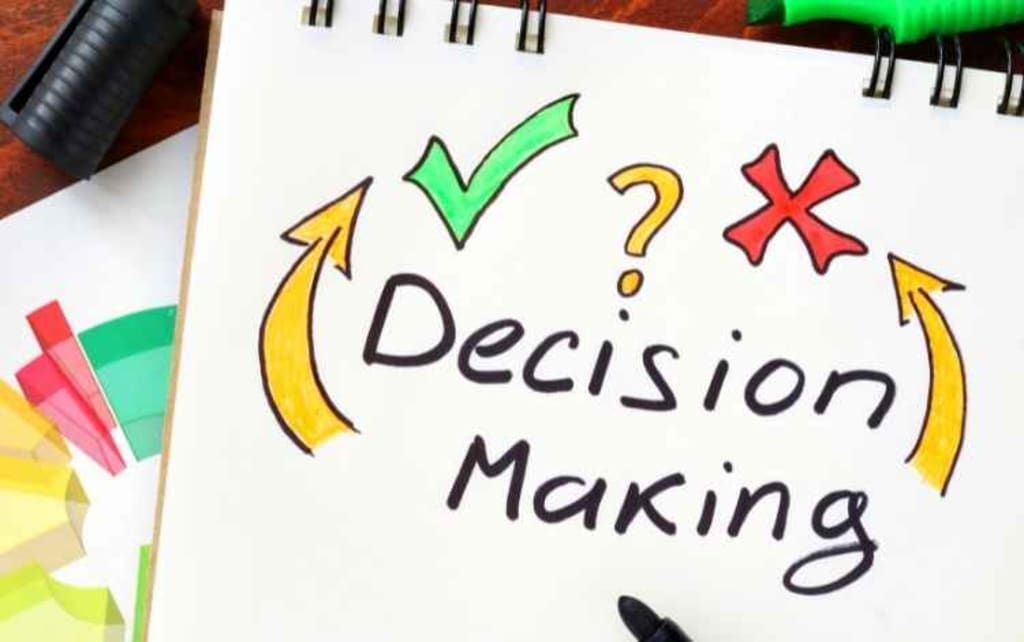THE PSYCHOLOGY OF DECISION-MAKING
Understanding How We Make Choices

Introduction:
Decision-making is an integral part of everyday life, influencing our actions, emotions, and overall well-being. From trivial matters like choosing what to wear or eat to life-altering decisions like selecting a career path or a life partner, our choices define who we are and shape our future. The psychology of decision-making is a fascinating field that delves into the intricacies of human behavior, cognition, and emotions that govern our choices. In this article, we explore the factors that influence decision-making and shed light on the cognitive processes that underpin our choices.
The Dual Process Model:
One prominent theory in the psychology of decision-making is the Dual Process Model, which proposes that we rely on two cognitive systems when making choices. System 1 is intuitive and automatic, operating quickly and unconsciously, while System 2 is analytical and deliberative, involving conscious effort and cognitive resources. System 1 often leads to snap judgments and heuristic-based decisions, while System 2 engages in careful reasoning and logical evaluation. Understanding the interplay between these systems can help us comprehend why we sometimes make impulsive choices, even when the rational option may be apparent.
Cognitive Biases:
Despite our best efforts, human decision-making is susceptible to cognitive biases—systematic errors in thinking that can lead to irrational choices. Some common biases include confirmation bias, where we seek information that confirms our preexisting beliefs, and availability heuristic, where we overestimate the likelihood of events based on their ease of recall. Becoming aware of these biases can empower us to question our assumptions and critically assess information, leading to more informed and objective decisions.
Emotional Influences:
Emotions play a significant role in our decision-making process. The somatic marker hypothesis suggests that emotions help us tag experiences with positive or negative feelings, guiding future choices. Fear, for instance, can prevent us from taking risks, while excitement may drive us to pursue new opportunities. Recognizing our emotional state and understanding how it influences our decisions can enable us to make more balanced and emotionally intelligent choices.
Decision Paralysis and Overchoice:
In an increasingly complex world, we often face the paradox of choice—having numerous options, which can lead to decision paralysis. When confronted with too many choices, people may feel overwhelmed, anxious, or even avoid making a decision altogether. Understanding this phenomenon can help us simplify choices and prioritize our values, facilitating more efficient and satisfying decision-making.
Prospect Theory:
Prospect Theory explores how individuals evaluate potential gains and losses when making choices under uncertainty. According to this theory, people are risk-averse when faced with potential gains but become risk-seeking when confronted with potential losses. This tendency can lead to inconsistent decision-making, as we may make different choices when framed as gains or losses, even when the objective outcome is the same.
Social Influences:
The decisions we make are often influenced by the people around us. Social psychology emphasizes the impact of social norms, group dynamics, and conformity on decision-making. We may conform to social expectations or adopt the choices of others, even if they are not aligned with our preferences. Recognizing these social pressures allows us to make decisions more aligned with our values and less influenced by external factors.
Conclusion:
The psychology of decision-making is a rich and intricate subject that delves into the very essence of human behavior. Understanding how we make choices helps us navigate the complexities of decision-making more effectively. By recognizing the influence of cognitive processes, emotional responses, biases, and social factors, we can develop strategies to enhance the quality of our decisions. Cultivating self-awareness, critical thinking, and emotional intelligence empowers us to approach decision-making with clarity and confidence, leading to a more fulfilled and purpose-driven life.
About the Creator
Alishba Humair
Passionate storyteller and wordsmith, I am on a journey to captivate hearts and minds through the power of words.My goal is to inspire, educate, and spark meaningful conversations that make a positive impact on the world.






Comments
There are no comments for this story
Be the first to respond and start the conversation.